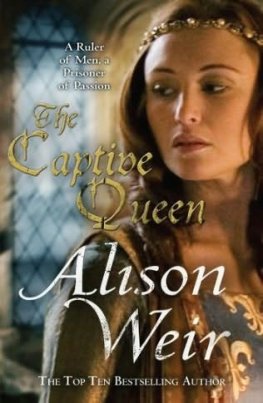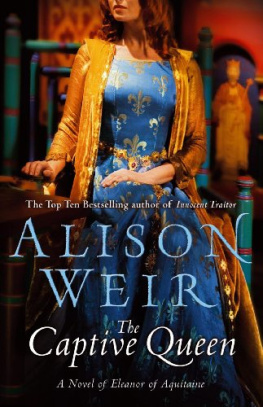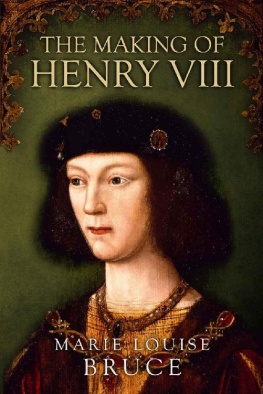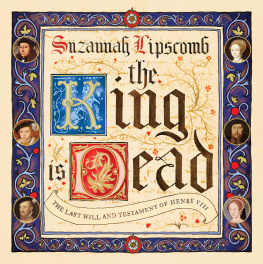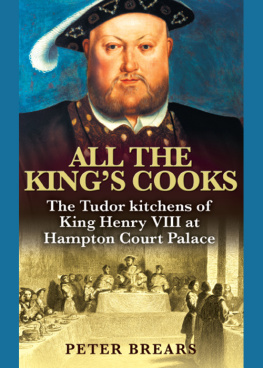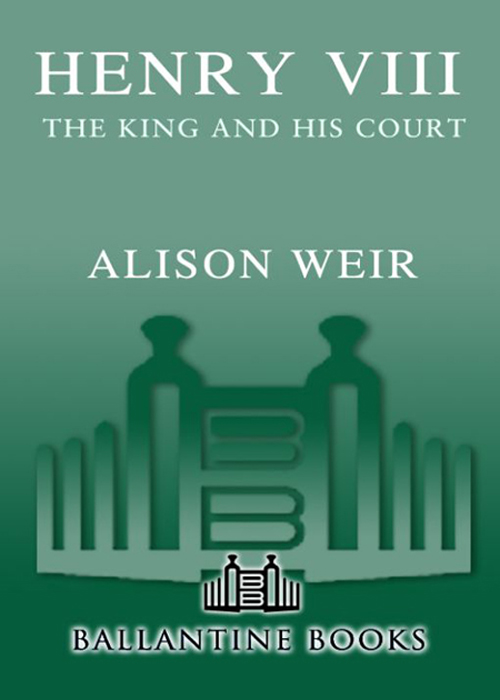
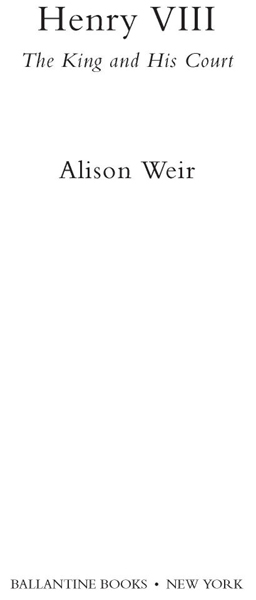
Contents
This book is dedicated to
DAVID and CATHERINE
to mark the occasion of their marriage
PRAISE FOR ALISON WEIR
HenryVIII:TheKingandHisCourt
Weirs nose for detail, her sharpness of eye, and her sympathetic touch make this a feast for the senses.... [She is] one of the most evocative of popular historians.
Publishers Weekly (starred review)
Entertaining... Weir is an immensely popular writer of books about European royalty, and her latest book gives ample evidence to her talent.
Booklist
EleanorofAquitaine:ALife
An alluringly candid portrait of this most public yet elusive of medieval women.
The Boston Globe
Evocative... A rich tapestry of a bygone age and a judicious assessment of her subjects place within it.
Newsday
TheLifeofElizabethI
An excellent account of the greatest of Englands remarkably great queens.
Daily Telegraph (London)
An extraordinary piece of historical scholarship.
The Cleveland Plain Dealer
Acknowledgments
Of the hundreds of source books that I have used, I wish to acknowledge my particular indebtedness to the following: Simon Thurleys The Royal Palaces of Tudor England; David Loadess The Tudor Court; Neville Williamss Henry VIII and His Court; David Starkeys The Reign of Henry VIII, Henry VIII: A European Court in England , and Rivals in Power; Carolly Ericksons Great Harry, Lacey Baldwin Smiths Henry VIII: The Mask of Royalty, and Peter Brearss All the Kings Cooks. I owe a great debt of gratitude to Dr. Simon Thurley and Dr. David Starkey, whose excellent books have made available to historians a wealth of unpublished contemporary sources. I must stress, however, that the conclusions in this book are entirely my own.
I wish to thank my editors, Will Sulkin and Anthony Whittome in the U.K. and Joanne Wyckoff in the U.S., and my agent, Julian Alexander, for their unfailing support and kindness. I should also like to thank my mother, Doreen Cullen, for selflessly giving up so many hours to act as my secretary, general amanuensis and counsellor; likewiseas evermy husband Rankin, my children John and Kate, my stepfather Jim Cullen, and my cousin Christine Armour for rallying round and assisting me so readily, to help me meet my deadline.
I owe a further debt of gratitude to all the other kind and generous people who have given support and encouragement while this book was in preparation: Catherine Agnew, Moore and Jill Armstrong, Beverley Arthur, Angela Bender, Carol Bingham, Tracy Borman, Richard and Yvonne Burnett, Terrence Cahill, Lucinda Cook, Paul and Paula Danholm, Suzanne Dean, Julian L. Dexter Williams, David Driver, Paul Eaglen, Deborah Emberson, Kate Gordon, Lewis Hales, Julie Handley, Eileen Hannah, Jorg Hensgen, Bruce Heydt, Elizabeth Hines, Max Hull, Stephanie Hunt, Fraser Jansen, Roger Katz, Margaret Kirk, Louise Law-ton, T. Anna Leese, Arnold and Edna Mann, John and Pauline Marston, Lyn Mathew, Janet McL. Mackay, Mary Moore, Syd Moore, Brad Mortensen, Peter Razzell, Lily Richards, Margaret Samborn, Karin Scherer, Patrick Smith, Sue Stephens, Jerry Sullivan, Inga Walton, Kenneth and Elizabeth Weir, Margaret Weir, Ronald and Alison Weir, Martha Whittome, and Jon Woolcott.
To you all, may I say again, thank you from the heart.
Introduction
In 1517, the papal nuncio Francesco Chieregato arrived at the court of Henry VIII and was stunned by its magnificence. The wealth and civilisation of the world are here, he marvelled, and those who call the English barbarians appear to me to render themselves such. I here perceive very elegant manners, extreme decorum and great politeness, and amongst other things there is this invincible King, whose acquirements and qualities are so many and excellent, that I consider him to excel all who ever wore a crown.
Coming from a Venetian imbued with the culture of the Italian Renaissance, this was praise indeed, and a reminder of what Henry VIII achieved during the first decade of his reign. Today, we need such a reminder, because the splendours of Henrys court are long vanished, and it requires a great leap of the imagination to reconstruct the reality from what few remains there are.
Henry VIII succeeded to the throne in 1509, to great acclaim. He had all the virtues expected of a Renaissance prince. Yet by the time he died in 1547, he had acquired the reputation of a tyrant whose hands were soaked in the blood of the many he had executedamong them two of his six wives. Because he married so many times, he has gone down in history as a veritable bluebeard. Over the centuries, the truth about the King has become blurred by his legend, which culminated in Charles Laughtons caricature of him in the 1930s film The Private Life of Henry VIII. Thanks to this, Henry still lives in the popular imagination as a man who thought of nothing but chasing the ladies, and who threw chicken bones over his shoulder as he presided over court feasts in the great hall.
The reality, of course, was strikingly different. As a rule, Henry did not dine in the great halls of his palaces, and his table manners were highly refined, as was the code of etiquette followed at his court. He was in fact a most fastidious man, andfor his timeunusually concerned with hygiene. As for his pursuit of the ladies, there is plenty of evidence, but most of it fragmentary, for Henry was also far more discreet and prudish than we have been led to believe. These are just superficial examples of how the truth about historical figures can become distorted.
Fortunately, scholars during the last few decades have undertaken a vast amount of research on Henry VIII and his court, and it is now clear that many of our earlier perceptions of both must be revised. Henry was a complex personality of many talents, and there is so much surviving source material for his reign that we know even the most intimate details of his personal life. Furthermore, this man of exquisite taste and a grand sense of majesty established the most magnificent court ever seen in England. No English sovereign ever owned as many houses as Henry VIII, or spent so lavishly on a lifestyle deliberately calculated to enhance his own prestige. Few monarchs have been surrounded by so many talented and charismatic personalities. And few have ever been so controversial.
My aim in this book has been to draw together a multitude of strands of research in order to develop a picture of the real Henry VIII, his personal life throughout his reign, the court he created, and the people who influenced and served him. Hitherto, studies of the Henrician court have concentrated on household organisation, art and culture, or courtier factions. I aim to paint a far broader canvas, which incorporates all these themes and much more, and sets the life and reign of the King, for the first time ever, against a realistic portrayal of his court.
In an age of personal monarchy, the court was at the hub of royal government, but this is not a political history of the reign: my brief has been to record the events that help build up a picture of the life and ethos of the King and the court. Henry VIIIs wives naturally played a large part in the life of that court, but, having already written a book about them, I have taken care to avoid too much repetition: where events were dealt with in detail in that former book, they are touched upon briefly, and only where relevant, here. I have also taken the opportunity to revise some of my conclusions in
Next page


